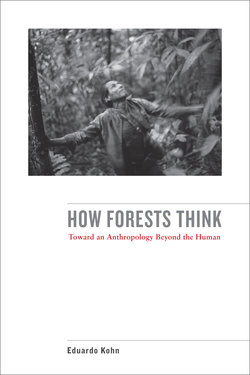How Forests Think

Реклама. ООО «ЛитРес», ИНН: 7719571260.
Оглавление
Eduardo Kohn. How Forests Think
Отрывок из книги
HOW FORESTS THINK
TOWARD AN ANTHROPOLOGY
.....
As such, the first chapters may seem far removed from an exposition of the complicated, historically situated, power-laden contexts that so deeply inform Runa ways of being—an exposition we justifiably expect from ethnography. But what I am trying to do here matters for politics; the tools that grow from attention to the ways the Runa relate to other kinds of beings can help think possibility and its realization differently. This, I hope, can speak to what Ghassan Hage (2012) calls an “alter-politics”—a politics that grows not from opposition to or critique of our current systems but one that grows from attention to another way of being, one here that involves other kinds of living beings.
This book, then, attempts to develop an analytic, which seeks to take anthropology “beyond the human” but without losing sight of the pressing ways in which we are also “all too human,” and how this too bears on living. The first step toward this endeavor, and the subject of the first chapter, “The Open Whole,” is to rethink human language and its relationship to those other forms of representation we share with nonhuman beings. Whether or not it is explicitly stated, language, and its unique properties, is what, according to so much of our social theory, defines us. Social or cultural systems, or even “actor-networks,” are ultimately understood in terms of their languagelike properties. Like words, their “relata”—whether roles, ideas, or “actants”—do not precede the mutually constitutive relationships these have with one another in a system that necessarily comes to exhibit a certain circular closure by virtue of this fact.10
.....